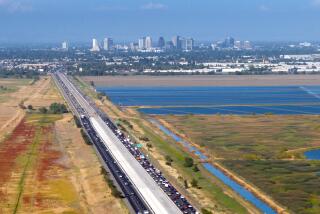Indian farmers protest road upgrade that would threaten their land
- Share via
Reporting from Dhanaula, India — Three hundred farmers and shopkeepers blocked national highway 64 in Dhanaula for several hours on a recent weekday, protesting a planned upgrade they say threatens their farmland and economic livelihood.
Government officials say they’re only surveying the area and haven’t decided on an exact route for the proposed $260-million four-lane freeway. But the locals weren’t waiting, fearful they would have little influence once the decision was announced.
“If they move this highway, it will pave over good farmland, bankrupt us and turn this into a ghost town,” said Jeet Pal Singh, a town councilman.
India, with its superpower ambitions and supercharged economy, desperately needs more and better roads, airports and terminals. An estimated 40% of its produce spoils on the way to market. Global trade is hampered by infrastructure bottlenecks.
The proposed upgrade here in western Punjab state, part of the 34,000 miles of new highways planned nationwide for the 2007-12 period, would replace a two-lane potholed road, where late-model cars jostle with belching trucks, oxcarts, pedestrians and goat herds.
But farmers strongly resist giving up their land in this predominantly rural nation, where 70% of the population still lives in about 630,000 villages, local identity remains strongly tied to farming and the prospect of moving to one of the nation’s overwhelmed cities is not particularly attractive.
Late last month, Prime Minister Manmohan Singh promised to introduce a land acquisition bill after thousands of farmers went on a three-week rampage, citing frustration over the amount of compensation they were offered for their land, which they were being forced to sell for an expressway project. They blocked the national highway, set vehicles ablaze and killed a policeman.
India’s existing land acquisition law, written in 1894, sets compensation extremely low and is ambiguous on when “public purpose” expropriations are justified. There are accusations that corrupt local officials use the law to secure cheap land for their business cronies.
Adding to the problem is India’s poor title search and land record system detailing who owns what.
“This colonial-era law was OK when land prices were not so high,” said Yoginder K. Alagh, a former power, science and technology minister and now chairman of Gujarat’s Institute of Rural Management. “But land’s becoming more scarce, and farmers know the value is rising.”
The new bill has not yet been made public, but reports suggest it would require that farmers be offered market rates for their land and that a substantial portion of the acreage be acquired voluntarily rather than through government dictate.
India’s road building projects have also been frustrated by corruption, which can leave farmers destitute and result in poorly built roadways that deteriorate within months.
“The road sector has always been the main source of income for the mafia,” India Today reported in 2006. “They either ask their men directly to grab the contracts or allow an outsider to take the contract after accepting a hefty commission.”
The picture isn’t uniform, however. India’s more progressive, economically oriented states, including Gujarat, Haryana and Punjab, have a much better record of managing land disputes. The simple reason: They compensate farmers at market rates, often taking the time to relocate them. Their example is seen as a model for the proposed new bill.
At the protest in Dhanaula, population 25,000, turbaned men stood in a semi-circle while female family members sat on the hot asphalt, their principal demand blaring from a World War II-era megaphone on a pushcart: Widen the existing road rather than bypassing the town and paving over fertile farmland.
When the road was shifted to this location in the mid-1970s, it killed the town, which then was relocated here, said Gagan Deep Singh, owner of a CD and DVD shop.
This proposed bypass would do the same for the current town, known for its livestock market, wooden toy makers and a mental hospital.
“Sure, India needs better roads, but we’re part of India too,” he said, standing near a DVD titled “The Hunk,” showing a shirtless actor in white stretch pants. “If you start bypassing every town, we’ll all go broke. What about the people?”
Gurpreet Singh, 27, a farmer with short, Miami Vice-style stubble, stood nearby nodding vigorously. The bypass would expropriate five of his 13 acres.
“It’s like taking the middle slice from a loaf of bread,” Singh said. “Even if they pay us, I can’t buy more land, no one will sell. It’s just wrong.”
A larger, better road might bring economic benefits, some said, but they hardly travel beyond the next big town, so the real beneficiaries would be rich people in fancy cars.
“All the business will be ruined in the name of a highway, just to go a little faster,” said Gurpreet Singh. “What sort of development is that?”
Signs of the economic growth that’s driving demand for better roads are evident all around, including billboards advertising new gated communities with names like “‘Dream City” and “Dynamic Homes.” They promise services the government too often doesn’t provide: 24-hour electricity, sewerage, a good water supply and wide roads inside the development.
Town councilman Jeet Pal Singh said they’ve tried to convince the state that widening the existing road is the best option. “They don’t listen,” he said. “They’re simply hell-bent.”
Nearby, elders sitting on benches say they favor the bypass, having watched five speeding trucks overturn in the town. The farmers are getting greedy, and the government’s offered compensation is fair, they say.
“Fifty years ago, we had horse carriages in Dhanaula and unpaved roads, but everyone helped each other out,” said Sant Singh, a retired rickshaw pedaler. “Now no one helps anyone, and crime and greed are everywhere. Money is supposed to make you happy, but it only seems to make people want more.”
After a while, local official Bahadur Singh arrived and listened to the protesters’ concerns and promised to set up a committee where residents will be represented.
Temporarily mollified, the demonstrators dispersed.
“We’ll give them a chance,” said Gurpreet Singh. “But if they procrastinate, we’ll come back with hundreds more people and really make ourselves heard.”
mark.magnier@latimes.com
Anshul Rana of The Times’ New Delhi Bureau contributed to this report.
More to Read
Sign up for Essential California
The most important California stories and recommendations in your inbox every morning.
You may occasionally receive promotional content from the Los Angeles Times.













